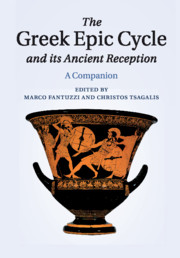Book contents
- Frontmatter
- Contents
- List of illustrations
- List of contributors
- Editorial note
- Introduction: Kyklos, the Epic Cycle and Cyclic poetry
- PART I APPROACHES TO THE EPIC CYCLE
- PART II EPICS
- 11 Theogony and Titanomachy
- 12 Oedipodea
- 13 Thebaid
- 14 Epigonoi
- 15 Alcmeonis
- 16 Cypria
- 17 Aethiopis
- 18 Ilias parva
- 19 Iliou persis
- 20 Nostoi
- 21 Telegony
- PART III THE FORTUNE OF THE EPIC CYCLE IN THE ANCIENT WORLD
- Works cited
- Index of principal passages
- Index nominum et rerum
15 - Alcmeonis
from PART II - EPICS
Published online by Cambridge University Press: 05 August 2015
- Frontmatter
- Contents
- List of illustrations
- List of contributors
- Editorial note
- Introduction: Kyklos, the Epic Cycle and Cyclic poetry
- PART I APPROACHES TO THE EPIC CYCLE
- PART II EPICS
- 11 Theogony and Titanomachy
- 12 Oedipodea
- 13 Thebaid
- 14 Epigonoi
- 15 Alcmeonis
- 16 Cypria
- 17 Aethiopis
- 18 Ilias parva
- 19 Iliou persis
- 20 Nostoi
- 21 Telegony
- PART III THE FORTUNE OF THE EPIC CYCLE IN THE ANCIENT WORLD
- Works cited
- Index of principal passages
- Index nominum et rerum
Summary
The Alcmeonis between the Theban and the Trojan cycles
Seven fragments of the epic Alcmeonis remain that were transmitted by various sources. The work is reported anonymous, with the circumlocution ‘the author of the Alcmeonis’ (ὁ τὴν Ἀλκμαιωνίδα πεποιηκώς / ποιήσας / γράψας / γεγραφώς) being used in all the extant quotations. Additional passages that have some chance belonging to the poem can be added to these relics.
The inclusion of the Alcmeonis to the Epic Cycle is much debated. The sources do not explicitly mention it. Yet the plot fits well in such a framework. Alcmaon, a prominent figure within the Theban saga, is the main character being the son of Amphiaraus, one of the Seven who failed the assault on Thebes (subject of the epic Thebaid) and himself one of the Epigonoi (the sons of the Seven) who destroyed Thebes in the subsequent campaign. The thematic congruity with the epic Epigonoi is clear, at least in the initial part. This led some scholars to postulate an equivalence between the two epics, where the Alcmeonis would be an alternative title of the Epigonoi or a (sub)title of a specific section of it. This suggestion that is consistent with a well-documented custom in the ancient epics cannot be ruled out.
Nevertheless such arguments are not strong enough to dismiss the preponderant position regarding the Epigonoi and the Alcmeonis as two separate poems. Cases of distinct epics sharing themes and episodes are common. Apart from some divergences surmised for some narrative details, the independence of the Alcmeonis from the Epigonoi is supported by its being a poem ‘wide in scope and diffuse in content’, rich in flashbacks and digressions, to such an extent that it would be excessive as a section of a poem, the Epigonoi, said to have been of 7,000 lines. The successful expedition against Thebes, that formed the thematic core of the Epigonoi, should have taken up less space in the Alcmeonis, being just one of several episodes of Alcmaon's heroic biography.
- Type
- Chapter
- Information
- The Greek Epic Cycle and its Ancient ReceptionA Companion, pp. 261 - 280Publisher: Cambridge University PressPrint publication year: 2015



